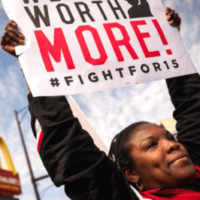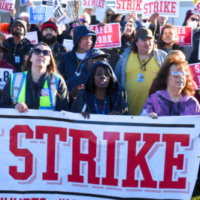New law ensures formerly incarcerated New Yorkers have fair chance to work;
Employers: consider qualifications first; don’t ask about criminal record until you’ve made conditional job offer
New York City—New Yorkers with conviction histories and their advocates rallied in Brooklyn this morning to celebrate the Fair Chance Act, a new law that takes effect today that will help ensure that people with records have a fair chance at employment and are not unlawfully shut out of the job market.
The new law requires employers in New York City to look at job applicants’ qualifications first, and to hold off on background checks and criminal history questions until they’ve found the person they want to hire.
Under the Fair Chance Act, it is illegal to ask about criminal history on job applications and during initial job interviews. Only after a job offer is made may employers ask about criminal convictions and—with the applicant’s permission—run a background check. After reviewing the applicant’s conviction history, employers may withdraw the job offer only if the candidate’s criminal record is directly related to the job or if hiring the individual would pose an unreasonable risk.
The new law applies to all employers with four or more employees in New York City. It does not apply to some jobs, such as police and peace officers and any job where an existing local, state, or federal law says that people with certain convictions are prohibited from consideration. More detailed information about the Fair Chance Act is available here and here.
The Fair Chance Act extends the reach of New York City’s existing fair-chance policy to the private sector. City government agencies have been operating under a fair-chance hiring policy since 2011, thanks to Executive Order 151, signed by then-Mayor Michael Bloomberg. It also includes important new facets that make it one of the strongest “ban the box” laws in the country.
Momentum for “ban the box” policies—so called because they prohibit the criminal conviction check-box on job applications—is growing nationwide, as access to employment is increasingly understood as crucial to reducing recidivism and reforming the criminal justice system. Currently, 19 states and more than 100 cities and counties, including Philadelphia, San Francisco, Seattle, Buffalo, Rochester, and Washington D.C., have adopted “ban the box.”
Major national employers, including Walmart, Target, Home Depot, Starbucks, Bed Bath & Beyond, and Koch Industries, have all voluntarily adopted corporate ban-the-box policies. The Obama administration is considering a federal policy for agencies and contractors, and legislation is pending in Congress. These policies are crucial tools for combatting stigma and discrimination, since nearly one in three adults in the United States has a criminal history that will show up in a routine background check.
Leaders of the Fair Chance NYC coalition gathered with elected officials in front of the Barclays Center in Brooklyn today to celebrate the new law. The coalition of more than 25 community, labor, and faith organizations includes VOCAL-NY, the National Employment Law Project, the Community Service Society, 32BJ SEIU, and Faith in New York, among others.
The Fair Chance Act was introduced by Council Members Jumaane D. Williams, Corey Johnson, and Ritchie Torres, at the request of Manhattan Borough President Gale Brewer. It was passed by the City Council in June.
VOICES FROM THE FAIR CHANCE NYC COALITION
Council Member Jumaane D. Williams (D-Brooklyn), deputy leader and co-lead sponsor of the Fair Chance Act:
“I am proud New York City has joined the ranks of more than 100 cities across the country to give all job applicants a fair chance at employment. Not only does employment strengthen communities and lower recidivism, but employers will have access to a broader range of qualified candidates to consider. This is the strongest ban the box law in the nation, and will ensure that all New Yorkers, including those with convictions for previous mistakes, will have an equal opportunity to compete for jobs they qualify for.”
Manhattan Borough President Gale A. Brewer, co-lead sponsor of the Fair Chance Act:
“We call this law the Fair Chance Act because that’s what it will give everyone. We will no longer let the mere fact that a person was arrested become a black mark that closes every door. We’re all better off when every New Yorker is free to build a better future. I’m proud to have sponsored this bill in partnership with Council Member Williams, and am thrilled to see it finally enacted.”
Council Member Corey Johnson:
“The Fair Chance Act will give all qualified applicants a fair chance to compete for jobs by deferring questions about criminal history until after a conditional job offer. More than five million New Yorkers with records will benefit from the chance to demonstrate their qualifications, and employers will be presented with a broader range of candidates from which to choose. Many employers report that it is people with criminal records who often work harder, are more willing to stay at a job for a longer period of time, and develop into valuable leaders.”
Council Member Ritchie Torres:
“All job applicants with the right qualifications and desire to work should be able to compete fairly for jobs and be considered for their skills, not past mistakes. The Fair Chance Act ensures that employers are giving all applicants the same level playing field, and I applaud the City Council for passing this important legislation.”
Public Advocate Letitia James:
“We must tear down barriers to employment for qualified New Yorkers trying to get back to work and rebuild their lives. The Fair Chance Act would eliminate a discriminatory and unjust employment practice, help break cycles of recidivism, and give struggling New Yorkers the second chance that everyone deserves. I want to thank Council Member Williams and my fellow co-sponsors of the Fair Chance Act for bringing this critical issue to the forefront.”
Marilyn Scales, a member of VOCAL-NY:
“When I came home from prison, all I wanted was a fresh start for me and my children. I applied for every job I could find, but was always asked to disclose my criminal record history. I never got interviews, and now, even after 10 years of no interaction with the police, I still struggle to find decent work. I know I am more than my criminal record and the Fair Chance Act will give me an opportunity to prove it.”
Nayantara Mehta, senior staff attorney with the National Employment Law Project:
“The Fair Chance Act makes good sense for employers, workers, and the community. It’s good for employers because they will have access to the full talent pool and can hire the best person for the job. Good for workers because they can be judged on their qualifications first and not on a past mistake that doesn’t reflect who they are now. Good for the community because it strengthens the economy and reduces recidivism.”
David R. Jones, president and CEO of the Community Service Society:
“The Community Service Society of New York congratulates the New York City Council for passing the Fair Chance Act. CSS is proud to have led the legal effort to enact one of the strongest laws of its kind in the country. Now that the Act is in effect, CSS looks forward to working with the City Commission on Human Rights to ensure its strict enforcement.”
Pastor Darren Ferguson, Mt. Carmel Baptist Church & Faith in NY:
“The Fair Chance Act is the first of many steps for returning citizens; it provides an initial opportunity for men and women to get through the interview process without being stigmatized by their past. As a pastor and returning citizen myself, I am pleased that we are moving towards a society where individuals are not re-sentenced after returning home from incarcerations.”
32BJ SEIU President Hector Figueroa:
“Good jobs can transform people’s lives, and the Fair Chance Act will give more New Yorkers a fair chance at transforming their own. This is a key step in reforming our criminal justice system. That’s why we’re supporting this vital legislation to ensure that men and women with a conviction history have the opportunity to get a good job and a bright future.”
Bill Lipton, state director of the Working Families Party:
“Working Families commends the New York City Council for seeking to repair lives and communities by passing ban-the-box legislation. It’s just plain wrong to sentence formerly incarcerated people to a lifetime of unemployment. This legislation will change the lives for hundreds of thousands New Yorkers and their families by giving them a fair chance in the job market.”
Glenn E. Martin, president of JustLeadershipUSA:
“Public safety has little to do with handcuffs and a lot to do with opportunity. Employers have a right and responsibility to take a potential employee’s criminal record into account. However, denying qualified jobseekers with criminal records the chance to compete for employment is the equivalent of denying all New Yorkers a safer city. Ban-the-box simply allows everyone to compete fairly.”
###



